

2024 ANNUAL REPORT

Contact information:
Phone: (205) 348-6233
Fax: (205) 348-2849
Physical address:
Institute for Social Science Research (ISSR) 306 Paul Bryant Drive East Tuscaloosa, AL 35487
Mailing Address: Box 870216
The University of Alabama Tuscaloosa, AL 35487
Follow us on LinkedIn - @ua-institute-for-social-science-research
Connect with us online - https://issr.ua.edu
Writer credits:
Despina Stavrinos, Andrea Underhill, articles adapted from original works by Brian Hudgins
A N E w E RA OF Leadership at I ssr


Despina Stavrinos, PhD
Director of the Insitute for Social Science Research, Professor of Psychology
In addition to being Director of ISSR, Despina Stavrinos, PhD, a developmental psychologist, is Founder and Director of the Translational Research for Injury Prevention (TRIP) Lab (https://triplaboratory.com).
As the newly appointed Center Director of the Institute for Social Science Research (ISSR), I am thrilled to introduce our vision for a transformative future. At ISSR, we are committed to being an interdisciplinary center of excellence, dedicated to conducting high-impact research that not only informs but significantly improves lives.
Our Mission: Research That Resonates
At the heart of ISSR lies a profound commitment to high-impact research. We strive to lead and support initiatives that harness the power of social sciences to address pressing societal issues. Our work extends beyond academic contributions, aiming to create tangible change in communities and individuals’ lives.
Identifying Key Domains for Impact
To realize our mission, we are focusing our efforts on two critical domains:
RESEARCH
DOMAIN
1.
Health and Well-Being Across the Lifespan: Leveraging our existing expertise and geographical positioning in the Deep South, we will explore innovative approaches to enhance health and well-being at every stage of life. By understanding the complexities of health in various contexts, we aim to develop interventions that promote healthier communities and empower individuals.
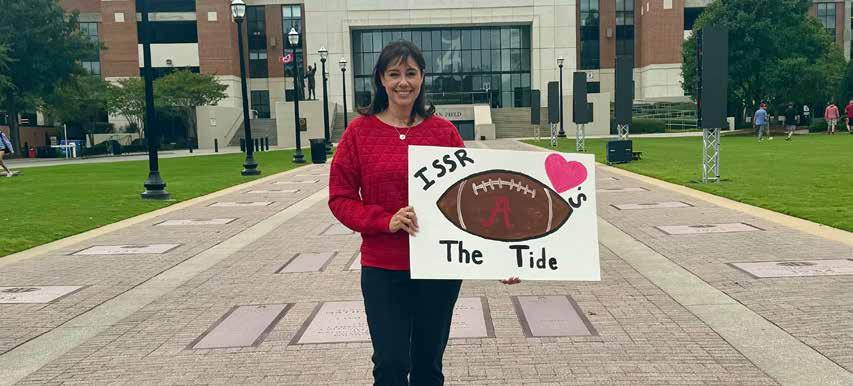
RESEARCH DOMAIN 2. Safety, Security, and
Technological Innovation: In a rapidly evolving world, ensuring safety and security is paramount. We will lead research that addresses the intersection of technology and societal safety, examining how innovation can enhance security measures while fostering trust and resilience within communities.
Leveraging Our Strengths for Greater Impact
At ISSR, we recognize the importance of aligning our research with the changing cultural landscape and the needs of our society. As an R1 institution, we possess the resources and expertise necessary to conduct large-scale, systems-level projects that drive meaningful change. Our interdisciplinary approach brings together eclectic perspectives, allowing us to tackle complex issues from multiple angles.
Serving the Research Community: Our Commitment to You
As we move forward, our commitment to serving the research community remains unwavering. Our Administrative Core is here to support you, ensuring that you can focus on groundbreaking research while we manage the complexities of research administration. Our Program Evaluation and Statistical Consulting cores will continue to provide critical support, enabling researchers to enhance the quality and impact of their work.
A Call to Action: Join Us in Making a Difference
As we embark on this transformative journey, I invite you to join us in our mission to lead high-impact research that changes lives. Your collaboration, insights, and passion are vital as we strive to create a lasting impact through social
science. Thank you for being a part of this new era at ISSR. Together, let’s unleash the potential of social science to create a better tomorrow.
Empowering Science Through Dedicated Administrative Support
At the Institute for Social Science Research, our commitment to high-impact research is matched by our robust support for our researchers. Our Administrative Core ensures that faculty and affiliates can focus on what they do best— conducting transformative science.
Our Motto: “You Focus on the Science; We Handle the Rest”
This guiding principle encapsulates our approach to research administration. Our comprehensive support system makes a significant difference in several key areas:
• Expertise in Pre- and Post-Award Management: Our team navigates the complexities of grant applications, funding opportunities, and compliance requirements, alleviating administrative burdens and maximizing research potential.
• Financial Tracking and Budget Management: We provide precise financial oversight, including budget projections and spend-down strategies, enabling informed decisions without the stress of financial uncertainty.
• Day-to-Day Administrative Support: From ordering equipment to streamlining processes, we manage the administrative side of research, allowing our faculty to focus their energy on innovative initiatives.
M EET YOUR PARTNERS in r esearch s upport
Our Administrative Core consists of dedicated professionals passionate about supporting our researchers:
C AROL i NE J UST i CE , MPH
Grants and Contracts Specialist

Grants and Contracts Specialist with expertise in pre- and post-award grant management.
R EBE k AH DAN i EL , MS
Accounting Assistant

Accounting Assistant focused on financial oversight and tracking.
L AUREN R USH i NG
Administrative Assistant

With 14 years of expertise guiding funded researchers through purchasing and day-to-day grant administration.
A NDREA U NDERH i LL , P H D
Research Communications Manager

Research Communications Manager dedicated to enhancing communication and collaboration within our research community.
By promoting operational efficiency and simplifying administrative hurdles, we enhance the productivity of our faculty and affiliates. Our strong infrastructure allows researchers to navigate the complexities of grant management with ease, leading to more innovative projects and less time spent on administrative tasks.
At ISSR, we believe that supporting our researchers is essential for achieving high-impact results. With our Administrative Core by your side, you can focus on your research while we take care of the rest. Let’s work together to drive meaningful change through social science.

Inaugural Board of Visitors for the Institute for Social Science Research
In 2024, ISSR proudly convened its inaugural Board of Visitors. This independent group, composed of three esteemed experts in social science research, policy research, and entrepreneurship, was formed to provide strategic guidance as part of a five-year planning and growth initiative.
From July 10-12, 2024, the Board conducted a comprehensive site visit to the UA campus, focusing on four critical areas: refining ISSR’s vision and value communication, developing thematic research areas and funding opportunities, assessing research productivity expectations, and evaluating the organizational structure of ISSR units. The Board engaged with the ISSR Director, ISSR faculty and staff, and key stakeholders, including Directors from two UA Institutes and university leadership.
The Board’s insights were informed by a detailed Charge Letter and background materials provided prior to the visit, facilitating focused discussions on ISSR’s status and future potential. The collective expertise and constructive feedback from the Board are expected to significantly enhance ISSR’s strategic direction, contributing to the growth and sustainability of social science research at UA.
ISSR leadership extends its gratitude to Board members Dr. Fay Lomax Cook, Dr. Deborah Ehrenthal, and
Theresa M.
for their invaluable contributions. Their involvement marks a pivotal moment for ISSR as it embarks on an ambitious journey to expand its research portfolio and extramural funding opportunities.
Strategic Advisor Insights
In addition to the Board of Visitors, Dr. Philip R. (Russ) Fine serves as a strategic advisor to ISSR, bringing extensive experience in research development and strategic planning from his concurrent roles as Director of three research centers at the University of Alabama at Birmingham (UAB). Dr. Fine will provide ongoing guidance and support as ISSR enhances its research capacity, playing a crucial role in implementing the Board’s recommendations and ensuring ISSR remains agile and responsive to the evolving landscape of social science research.
A Path Forward
The inaugural Board of Visitors and the strategic advisory role of Dr. Russ Fine represent a significant step forward for ISSR as it embarks on a journey of growth and transformation. The insights and recommendations from the Board will serve as a foundation for ISSR’s strategic planning, enabling the Center to enhance its research capabilities, increase funding opportunities, and make a lasting impact on social science research at The University of Alabama. With a dedicated leadership team and a clear strategic direction, ISSR is poised to thrive in the years ahead.
RESEARCH
ISSR U N v E i LS N E w R ESEARCH D OMA i NS : a c ommitment to s ocia L s cience and c ommunity Impact

ISSR is proud to announce its newly identified research domains, aimed at addressing critical societal challenges through a robust social science lens. These thoughtfully selected domains align with both the University’s goals and the pressing needs of the state, particularly in the context of issues affecting the West Alabama region, the Black Belt, the state, and the broader Deep South.
Building on a Strong Foundation
As part of its commitment to lead and support high-impact research, ISSR is enhancing its existing infrastructure to expand its reach and effectiveness. The Center’s focus on key research domains aims to strengthen its contributions to the communities it serves, ensuring that research translates into actionable solutions.
Cross-Cutting Objectives: Integrating Social Science Across Campus
Recognizing that social science intersects with all facets of life, ISSR has established cross-cutting objectives that connect with various institutes and centers on campus. These objectives aim to integrate social science perspectives into the important work already being conducted at the University.
By involving social science perspectives in multifaceted research initiatives, we gain valuable insights that enhance our understanding of complex issues. This interdisciplinary approach allows us to address multifaceted problems more effectively and develop comprehensive solutions.
DOMAIN I:
Health and Well-Being Across the Lifespan
The first domain ISSR is prioritizing is Health and WellBeing Across the Lifespan. This domain seeks to explore how social, economic, and environmental factors influence health from infancy to old age.
“Given the unique health challenges faced by communities in West Alabama, our research will prioritize addressing rural health issues,” stated Dr. Despina Stavrinos, the Director of ISSR. “We recognize the disparities in healthcare access and resources and are committed to developing targeted interventions that meet the specific needs of these populations.” To strengthen its efforts in this domain, ISSR will collaborate with University-based Institutes such as the Alabama Life Research Institute (ALRI) and the Institute for Rural Health Research, along with key state agencies including the Alabama Department of Public Health, Alabama Department of Rehabilitation Services, Alabama Department of Veterans Affairs, and the Alabama Department of Mental Health. These collaborations will enable ISSR to leverage resources and expertise in tackling critical health challenges from a social science perspective. By engaging with local stakeholders, ISSR aims to develop culturally relevant interventions that promote health and well-being, focusing on how social structures and community dynamics affect health outcomes. Through this commitment, ISSR is poised to
make a meaningful impact on the health and well-being of vulnerable populations in our region.
DOMAIN II: Security, Safety, and Technological Innovation
The second domain emphasized by ISSR is Security, Safety, and Technological Innovation, which focuses on reducing risks, enhancing resilience, and promoting stability for populations facing economic, geographic, or social vulnerabilities. This area examines the interplay between social systems and community safety, emphasizing the importance of addressing the unique challenges that vulnerable communities encounter. We are excited to leverage our strong partnerships with thriving institutes on campus, including the Alabama Transportation Institute, the Alabama Water Institute, the Alabama Cyber Institute, and the Center for Artificial Intelligence. These collaborations will enhance our research capabilities and drive innovative solutions to contemporary security, safety, and technological challenges.
Advancing Community Resilience
ISSR aims to advance community resilience by examining the factors that contribute to safety and stability. By exploring critical questions related to the intersection of society and safety, ISSR seeks to provide actionable insights that contribute to the prevention and promotion of human security. Through this research, we aspire to inform interventions, helping communities navigate challenges and enhance their overall well-being.
Looking Ahead: A Commitment to Research Excellence
As ISSR embarks on this new chapter, it remains dedicated to expanding its research domains and enhancing its infrastructure to support high-impact initiatives. The future of ISSR is bright, and the Center is excited to lead the way in transforming research into actionable solutions that improve lives across Alabama.
For more information about ISSR and its initiatives, visit https://issr.ua.edu.

CURRENT RESEARCH TOPICS: Reproductive Health, Occupational Health and Safety, Veterans Well-Being
This domain explores how social, economic, and environmental factors influence health from infancy to old age.

CURRENT RESEARCH TOPICS: Transportation Safety and Driver Behavior, International Conflict
This domain examines the factors that contribute to safety and stability.
DOMAIN I: PROJECT 1
Unpacking the Complexities of Women’s Health: Dr. Diane Tober’s Eggonomics and the Social Determinants of Health

Tober, PhD, Associate Professor

The landscape of women’s health has taken center stage as Dr. Diane Tober, Associate Professor of Anthropology and Center Scientist, unveils her groundbreaking book, Eggonomics. This timely work delves deep into the multifaceted world of the egg donation industry, raising critical questions about the ethical implications of commodifying women’s reproductive capabilities.
In a society where the pursuit of family often intersects with advanced reproductive technologies, Dr. Tober’s research illuminates the often-overlooked ramifications of this industry on women’s health and well-being. By examining the social determinants of health through the lens of egg donation, Eggonomics provides a unique perspective on how systemic factors shape the experiences of egg donors and the broader implications for maternal health.
A Critical Examination of the Egg Donation Industry
In Eggonomics, Dr. Tober pulls back the clinical curtain on an industry worth billions, exploring egg donors’ emotional and physical journeys. The book reveals the uncomfortable realities faced by these women— individuals who are essential to the dreams of families seeking to conceive. However, Dr. Tober’s research highlights that not all clinics prioritize the well-being of their donors with the same care afforded to their paying patients.
“The egg donation process can often reduce women to mere commodities,” Dr. Tober explains. “This commodification raises critical questions about the ethics of how donors are treated and the broader societal implications of viewing women’s bodies as sources of profit.”
The Impact of Global Capitalism
Dr. Tober’s work does not shy away from addressing the influence of global capitalism on reproductive health. As technological innovations propel the egg donation industry forward, private equity firms increasingly infiltrate the realm of fertility medicine, transforming once-small clinics into multinational enterprises. This shift raises significant concerns about the core medical principle of “do no harm.”
Eggonomics serves as a wake-up call for researchers, medical professionals, and policymakers, urging them to consider the implications of turning personal health decisions into profit-driven ventures. Drawing from her extensive anthropological fieldwork, Dr. Tober provides a meticulously researched narrative that underscores the need for ethical considerations in reproductive health practices.

Highlighting Women’s Health and Social Science
As a leading figure in the field of anthropology, Dr. Tober’s work emphasizes the importance of understanding women’s health through a social determinants framework. Her research aligns with ISSR’s commitment to investigating how social, economic, and environmental factors affect health outcomes, particularly in the context of marginalized populations.
“By framing women’s health issues within the broader context of social determinants, we can better understand the systemic barriers that impact women’s access to care and overall well-being,” Dr. Tober states.
A Call to Action
Eggonomics is not just a book; it is a call to action for a more ethical approach to reproductive health. Dr. Tober’s insights encourage open dialogue and critical examination of the relationships between technology, capitalism, and women’s health.
As ISSR continues to lead the charge in addressing these pressing issues, Dr. Tober’s work stands as a testament to
the Institute’s capabilities in advancing research that prioritizes social justice and the health of women. Through her contributions, Dr. Tober not only sheds light on the complexities of the egg donation industry but also advocates for a future where women’s health is treated with the dignity and respect it deserves.
For those interested in exploring Dr. Tober’s work further, Eggonomics is available for purchase from https://www.routledge.com.

DOMAIN I: PROJECT 2
Enhancing Occupational Health: Dr. Benjamin McManus Completes NIOSH K Award Research on Surgical Residents
Dr. Benjamin McManus, an Associate Professor at ISSR, has successfully completed his prestigious K01 Mentored Research Scientist Development Award from the National Institute for Occupational Safety and Health (NIOSH). Spanning from 2021 to 2024, this grant has supported his groundbreaking research focused on the well-being of medical residents, specifically examining the critical factors of fatigue, stress, and work organization that contribute to motor vehicle crashes during commutes and shifts.
As a psychologist with a keen interest in occupational health, Dr. McManus utilized the K award to enhance his research skills and significantly impact the safety and health of healthcare workers. “The K01 grant provided me with a unique opportunity to expand my research skill set through specialized training activities,” he explained. “This award has been instrumental in my efforts to improve the well-being of healthcare workers and the safety of work design in medical settings.”
Addressing a Pressing Issue
Motor vehicle crashes remain a leading cause of death, with fatigue as a major contributing factor. Dr. McManus’s research aimed to bridge the gap between resident well-being and the
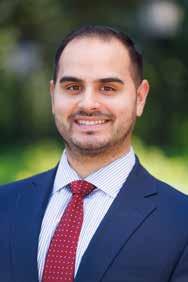
demanding training hours required during residency programs—a topic that has long been debated yet remains under-researched. “Finding the right balance between the rigorous demands of residency and the mental and physical well-being of residents is crucial,” Dr. McManus noted.
Importantly, the same factors affecting surgical residents are prevalent among other occupations, particularly shift workers and those who drive for a living. Understanding how fatigue and work organization impact these groups is essential for developing effective interventions. “This research has broader implications for various at-risk occupational populations who face similar challenges,” Dr. McManus added.
A Social Science Perspective
At the heart of Dr. McManus’s work is a commitment to understanding the social determinants of health within occupational settings. By investigating how work organization and environmental factors affect the well-being of surgical residents, he aims to develop interventions that can reshape future work settings in healthcare.
The study characterized residents’ well-being and caseloads, translating findings into actionable strategies that address


the unique challenges faced by medical professionals. “We are not just looking at individual factors but also at how the social and organizational context influences health outcomes,” Dr. McManus explained. “This research has the potential to set new standards for work design that prioritize the health of healthcare workers.”
Recent Publication Highlight
Dr. McManus recently authored a publication titled “Simulation Integration With Total Worker Health.” This article focuses on the integration of simulation-based training methods with Total Worker Health (TWH) to enhance occupational safety and health practices. It highlights the effectiveness of simulation in addressing top OSHA (Occupational Safety and Health Administration) violations, improving worker competency, and promoting safer work environments. This publication underscores Dr. McManus’ commitment to advancing occupational health through innovative methods and collaborative research.
McManus B, Redden KB, White ML. Simulation Integration With Total Worker Health. Workplace Health Saf. 2024 Nov;72(11):514. doi: 10.1177/21650799241271099
Future Directions
Looking ahead, Dr. McManus plans to submit a larger multi-year grant focused on other at-risk or vulnerable occupational populations. This next phase aims to expand the research scope to include various sectors where fatigue and work-related stress present significant health risks. “By broadening our focus, we hope to create a comprehensive
understanding of how these factors impact different groups and develop interventions that can be applied across various industries,” he stated.
Dr. McManus’s research represents a significant step forward in the field of occupational health, particularly within the high-stakes environment of medical training. The completion of his NIOSH K award project empowers him to contribute meaningfully to the academic community and to the health and safety of future medical practitioners.
With a focus on integrating social science principles into occupational health, Dr. McManus is poised to make lasting changes that benefit not only surgical residents but also the healthcare system. As he continues this vital work, ISSR remains committed to supporting research that enhances the well-being of individuals in all domains of life.
For more information about Dr. McManus’s research, including his recent publication and the initiatives at ISSR, visit https://issr.ua.edu.
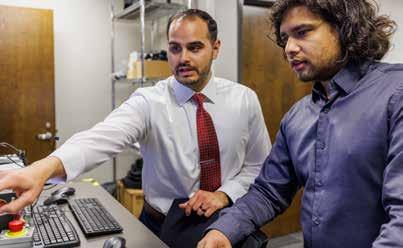
DOMAIN I: PROJECT 3
BRAVO-Vets: Transforming the Lives of Alabama’s Justice-Involved Veterans

David White, MPH, MPA Project Manager

BRAVO-Vets (Brain Injury Resource Facilitation And Veteran Outreach for Criminal-Justice-Involved Veterans) is on a mission to fundamentally transform the lives of veterans entangled in the criminal justice system. By tackling the complex challenges associated with traumatic brain injuries (TBI), mental health disorders, and social determinants of health, BRAVO-Vets delivers evidence-based screenings and individualized care. Our goal? To reduce recidivism, lower suicide rates, and empower veterans to reintegrate into society with dignity and renewed purpose.
The Need for Targeted Intervention
The Council on Criminal Justice highlights the grim realities facing veterans in the justice system. Mental health disorders, substance use issues, and economic instability—often worsened by TBI—are significant contributors to this crisis. Alarmingly, veterans with TBI are 59% more likely to become involved in the justice system than their non-injured peers. This stark data underscores the urgent need for targeted interventions like BRAVO-Vets to help break the cycle.
Strength in Collaboration
BRAVO-Vets thrives on the strength of its interdisciplinary partnerships. By collaborating with the Alabama Department of Mental Health (ADMH), the Alabama Bureau of Pardons and Paroles (ABPP), The University of Alabama, the Alabama Department of Rehabilitation Services (ADRS), and the Administrative Office of Courts (AOC), BRAVO-Vets ensures that veterans receive a comprehensive suite of services tailored to their multifaceted needs. This collaborative approach guarantees that those facing TBI, mental health challenges, and socioeconomic barriers receive the holistic support essential for recovery and successful reintegration.
“The power of BRAVO-Vets lies in our ability to bring together wide-ranging expertise to meet veterans where they are,” says David White, Program Manager of BRAVO-Vets. “We are committed to building trust and providing meaningful support that helps veterans reclaim their lives.”
A Modified Approach to Care
Due to budget constraints that halved our funding, BRAVO-Vets was forced to eliminate Care Coordinators, limiting the availability of in-person support services. Currently, Screeners and Navigators provide phone assessments and connect veterans to community resources. However, restoring Care Coordinators remains a top

priority, as they were crucial in developing personalized care plans that facilitated access to mental health treatment, housing, and vocational assistance.
Despite these challenges, BRAVO-Vets is unwavering in its commitment to providing support during critical moments. The absence of Care Coordinators has highlighted just how vital in-person care is for fostering long-term stability and successful reintegration into society.
Addressing the Social Determinants of Health
BRAVO-Vets is uniquely positioned to tackle the social determinants of health (SDOH) that profoundly impact veterans’ well-being. By partnering with agencies focused on housing, education, and employment, the program stabilizes key factors contributing to criminal justice involvement. Veterans who secure stable housing and meaningful employment are significantly less likely to re-offend and more likely to lead fulfilling, self-sufficient lives.
Why Social Scientists Should Take Notice
BRAVO-Vets exemplifies how social science research can combat health disparities. The program provides a valuable opportunity to examine how evidence-based interventions can produce positive outcomes for vulnerable
Ms. April Turner, State TBI Director, Alabama Department of Rehabilitation Services and Mr. David White, BRAVO-Vets Project Manager
populations—not merely by addressing symptoms but by tackling the root causes of adverse health and social issues. BRAVO-Vets serves as a compelling case study of how interdisciplinary research translates into meaningful, impactful action.
The Road Ahead
BRAVO-Vets aspires to broaden its reach to serve all veterans across Alabama, expanding beyond those currently involved in the justice system. By offering comprehensive support, including resource facilitation and care coordination, the program aims to mitigate disparities and enhance veterans’ quality of life on a larger scale. With continued support from ISSR, BRAVO-Vets is determined to refine and expand its model, identifying and addressing TBI and mental health needs early on, ultimately reducing the risks of suicide and recidivism.
BRAVO-Vets is more than just an intervention—it’s a steadfast commitment to ensuring that those who have served our country receive the comprehensive support they need to rebuild their lives. Through sustained collaboration with ISSR, state agencies, and community partners, BRAVOVets is poised to lead the way in veteran care and criminal justice reform.
DOMAIN II: PROJECT 1
Driving Change: The Future of Injury Prevention Research at UA’s TRIP Lab

Dr. Despina Stavrinos Director

Dr. Benjamin McManus
Associate Professor
ISSR is embarking on an exciting journey to revolutionize motor vehicle injury prevention, driven by Dr. Despina Stavrinos and the Translational Research Injury Prevention (TRIP) Lab. This cutting-edge facility made possible through partnerships between ISSR, the Alabama Transportation Institute, and Mercedes-Benz USA International, harnesses innovative technology and a unique psychological perspective to tackle critical issues surrounding road safety.
An Innovative Research Environment
At the core of the TRIP Lab is a state-of-the-art driving simulator ingeniously crafted from a real Mercedes GLE 63S AMG. This innovative setup offers researchers a fully immersive environment, allowing participants to experience driving scenarios that closely mimic real-life conditions. The simulator captures both the physical aspects of driving and the psychological factors influencing driver behavior.
The TRIP Lab features two additional desktop simulators connected to the main Mercedes simulator, allowing three drivers to simultaneously navigate the same simulated environment. This setup facilitates the study of teamwork and decision-making in driving scenarios—an approach commonly seen in video gaming but rare in academic research.
Bridging Different Fields for Impact
The TRIP Lab’s vision extends beyond traditional transportation research, embracing an interdisciplinary approach that bridges various fields to enhance motor vehicle safety. The lab is set to launch three groundbreaking research studies that exemplify this collaborative spirit.
Study 1: Human-Autonomy Interaction Study
The first study, sponsored by the U.S. Department of Defense, investigates human-autonomy interaction within the context of AI and autonomous driving technologies. This research aims to understand how drivers engage with these advanced systems, a crucial area as the military explores integrating autonomous vehicles into their operations.
Dr. Benjamin McManus, Assistant Director of the TRIP Lab, highlights the complexity of this endeavor: “Successfully researching humanautonomy interaction requires a large, interdisciplinary team. We are collaborating with experts in AI, cognitive psychology, and working closely with military and industry partners such as the US Army’s Ground Vehicle Systems Center and Analytical AI. This collaborative effort is essential to ensure we can address the multifaceted

tr I p Lab
e stab L ished in 2009
r esearch: $10M i N FUND i NG
e ducation: 150+ STUDENTS
o utreach: APPROX i MATELY 21,000 STUDENTS STATE wi DE
L to R:
challenges of integrating autonomy into military applications, which have important implications for both safety and national security.”
In this study, researchers will not only assess how different levels of autonomy impact driver behavior and decisionmaking but also will record how teams complete tasks and interact with one another throughout the mission. The military is particularly interested in effective techniques to promote optimal performance, making this focus critical.
Dr. Stavrinos adds, “By understanding these dynamics, we can inform the design of autonomous systems that enhance safety and efficiency while ensuring that drivers feel confident in their interactions.”
This study aims to improve military applications and contribute to the broader understanding of how autonomous vehicles can enhance safety in critical operations.
Study 2: Engineering Safety Solutions Study
The second study partners with civil engineering experts to investigate safety countermeasures designed to reduce the prevalence of motor vehicle crashes in identified hotspots. Using crash reports and data from local traffic incidents, researchers will simulate actual roadway environments in the driving simulator.
The goal is to test various engineering interventions, such as improved lighting, signage, and roadway design elements, to assess their effectiveness in changing driver behavior and reducing collisions. By simulating these scenarios, the TRIP Lab can evaluate the potential for these countermeasures to promote safety in a controlled environment before real-world implementation.
We thank the U.S. Department of Transportation for supporting our efforts through the Safe Streets for All initiative. This funding enables us to inform the proposed second phase of our implementation, where we will take our findings from the simulator onto real roads and assess whether the promising countermeasures lead to tangible changes in driver behavior, particularly in under-resourced areas. The insights gained from this study aim to inform urban planning and traffic management strategies, ultimately enhancing the safety of Alabama’s roadways.
Study 3: Post-Concussion Driving Study
The third study focuses on the critical issue of driving after a mild traumatic brain injury, also known as a concussion. The study is in collaboration with The Ohio State University and Nationwide Children’s Hospital. This research leverages partnerships with public health and sports medicine professionals who refer patients acutely post-concussion.
Key UA collaborators on this project include Dr. Ray Stewart, Dr. Brett Bentley, and Dr. Russ Guin, physicians leading UA’s Sports Medicine Clinic.
This study is particularly innovative as it will track young individuals who have sustained mild traumatic brain injuries over time. Using a longitudinal design, researchers will monitor participants weekly as their symptoms resolve, allowing for an in-depth analysis of changes in driving behaviors and capabilities.
Dr. Amanda Hudson, the TRIP Lab program manager, emphasizes the significance of these partnerships: “Working closely with sports medicine experts allows us to interpret our findings in a way that is meaningful and translatable into clinical practice. We aim to provide evidence-based guidelines for when young drivers can safely resume driving after a mild traumatic brain injury.”
This research addresses a critical gap in post-injury protocols, as driving is seldom discussed in concussion recovery plans. The findings will provide valuable insights for clinicians, helping them make informed decisions prioritizing patient safety while facilitating a timely return to driving.
A Vision for the Future
The TRIP Lab is committed to addressing the complexities of motor vehicle safety through this holistic, interdisciplinary approach. By integrating insights from psychology, engineering, and public health, the lab aims to develop practical applications that improve driving safety for everyone.
As a state-of-the-art facility and resource now available on campus, the TRIP Lab is open to collaborating. Interested parties can contact Dr. Stavrinos for potential partnerships, schedule a tour, or arrange a technical tour featuring the driving simulator for upcoming meetings. This is an excellent opportunity to expose the public to the innovative facility that is found right here in Tuscaloosa, Alabama.
As the TRIP Lab continues to push the boundaries of technology and research, it stands as a beacon for the future of driving safety. By merging advanced simulation technology with a profound understanding of human behavior and interdisciplinary insights, The University of Alabama is paving the way for a safer, more secure driving experience for all.

The University of Alabama Driving Simulator made possible through partnerships with UA College of Arts and Sciences, Alabama Transportation Institute, and Mercedes-Benz US International, Inc.


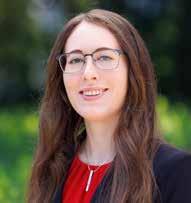

DOMAIN II: PROJECT 2
Expanding the Frontiers of Conflict Research: Dr. Doug Gibler and the International Conflict Database
Dr. Doug Gibler, Professor at ISSR, is pioneering advancements in the study of international conflict through the development of the International Conflict Database. This comprehensive database offers an invaluable resource for researchers, policymakers, and practitioners seeking to analyze the intricacies of global conflict and enhance our understanding of its dynamics.
The International Conflict Database represents a significant evolution in the field, providing meticulously curated data on inter-state conflicts. By addressing shortcomings in previous datasets, Dr. Gibler and his team have created a resource that not only captures a broad spectrum of conflict events but also ensures the accuracy and consistency of the information presented. “Our work has focused on creating a reliable dataset that reflects the complexities of international confrontations and their outcomes,” Dr. Gibler explained.
A Comprehensive Resource for Policy and Research
With over 30,000 documented international events spanning nearly 200 years, the International Conflict Database is a critical tool for those interested in the historical and contemporary dimensions of conflict. This extensive collection draws from approximately 35,000 historical sources, allowing for a detailed analysis of threats, displays, and uses of force between states from 1816 to 2014.

“The datasets we provide are transformative for scholars and practitioners alike,” Dr. Gibler remarked. “This is the most reliable source of inter-state conflict data available, enabling researchers to study conflict with a high degree of confidence in the underlying information.”
The database comprises eight meticulously constructed datasets that categorize and identify instances of conflict, making it easier for users to extract meaningful insights and trends. This resource is essential for political scientists, historians, and policymakers who seek to understand the causes and consequences of international conflict and to develop strategies for conflict prevention and resolution.
Impact on Safety and Security
Dr. Gibler’s work directly aligns with ISSR’s focus on safety, security, and technological innovation. By providing a robust framework for analyzing international conflicts, the International Conflict Database contributes to efforts aimed at enhancing global stability. Understanding the historical patterns and dynamics of conflict is crucial for informing effective policy responses and strategies to mitigate future confrontations.
“By analyzing past conflicts, we can better anticipate and navigate contemporary challenges,” Dr. Gibler stated. “The insights gained from our dataset can significantly inform decision-making processes aimed at fostering peace and security.”
Doug Gibler, PhD Professor https://internationalconflict.ua.edu


Embracing Technological Advances
The International Conflict Database exemplifies the integration of technological innovation in the social sciences. Employing advanced data collection and analytical techniques, Dr. Gibler and his team ensure that the database is comprehensive and user-friendly. This commitment to accessibility allows a wide range of users to engage with the data effectively, facilitating its application in various research and policy contexts.
“Our goal is to make this valuable resource as accessible as possible,” Dr. Gibler noted. “By leveraging technology, we can reach a wider audience and empower more individuals to utilize our findings in their work.”
Looking Forward: Integrating AI for Enhanced Research
In a significant advancement for the International Conflict Database, Dr. Gibler recently secured a $500,000 grant from the National Science Foundation, aimed at further enhancing the database’s capabilities through the integration of artificial intelligence (AI) and large language models (LLMs). This funding will help reduce the labor-intensive processes currently involved in data collection, which includes analyzing around one million newspaper articles annually.
“The hope is that within three to four years, we will have the ability to automate the coding of conflict events, allowing
researchers and policymakers to analyze this data in real time,” Dr. Gibler explained. This new approach will streamline the data collection process and expand the database beyond its current 2014 endpoint, providing valuable insights into contemporary international interactions.
Dr. Gibler emphasized the project’s potential to enhance understanding of conflict escalation and resolution. “The more data we have, the better we can identify patterns in conflict and understand the dynamics that lead to both escalation and resolution,” he stated. The integration of AI will enable the conflict lab to leverage a broader range of media sources, coding events with greater efficiency and accuracy.
Key to this endeavor is collaboration with ISSR computer engineer Piyush Pawar, MS who brings expertise in AI and machine learning to the project. His involvement will help ensure that the models developed for coding conflict events are not only effective but also scalable, paving the way for advancements in data analysis across various fields. This interdisciplinary approach exemplifies how collaboration between computer engineering and political science can drive innovative solutions to complex global issues.
As Dr. Gibler continues to recruit undergraduate and graduate researchers to work in his lab, ISSR is poised to advance its mission of providing impactful research that contributes to global peace and security.
ENGAGEMENT AND OUTREACH
C OMMUN i TY E NGAGEMENT for s afer r oads
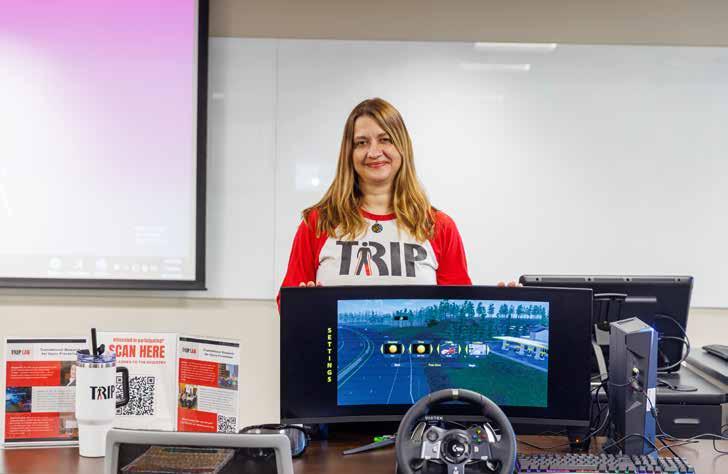
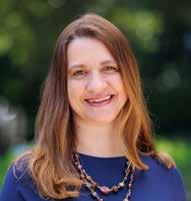
Kelly Koncsol Outreach Program Manager
ISSR believes that effective social science research goes beyond academia; it must actively engage with communities to create meaningful impact. Community engagement and outreach are essential components of our mission, allowing us to translate research findings into practical solutions that address pressing societal challenges. By fostering partnerships and collaborating with local stakeholders, we ensure that our work is relevant, responsive, and beneficial to the people we aim to serve.
Community Engagement for Safer Roads
One exemplary initiative that embodies this commitment is the Translational Research Injury Prevention (TRIP) Laboratory. With motor vehicle crashes remaining one of the leading causes of death among young people—and alarmingly high rates in Alabama, especially in rural areas like West Alabama—the TRIP Lab is dedicated to making teen drivers safer through comprehensive outreach and education.

The TRIP Lab focuses on understanding the psychological aspects of transportation-related injuries and translating those findings into effective prevention practices. “Our goal is to empower young drivers with the knowledge and skills they need to make safe choices on the road,” says Kelly Koncsol, the TRIP Lab’s Outreach Program Manager. Through interactive classroom presentations and hands-on experiences, the lab directly engages teens, fostering awareness of the dangers of distracted driving.
Utilizing a portable driving simulator, the TRIP Lab offers students a unique opportunity to experience the consequences of unsafe driving behaviors in a controlled, safe environment. This innovative approach not only heightens awareness but also encourages discussions about responsible driving choices among peers.
Furthermore, the TRIP Lab’s outreach efforts are supported by strong partnerships with organizations like the Regional Planning Commission of Greater Birmingham, State Farm, and the Alabama Department of Transportation. These collaborations enable the lab to expand its reach and impact, ensuring that vital safety information gets into the hands of those who need it most.
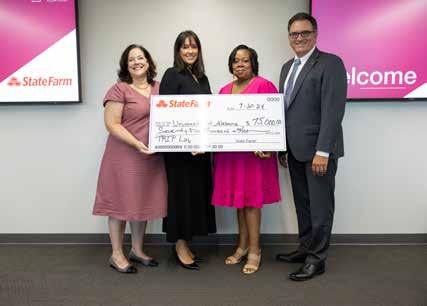



ENGAGEMENT AND OUTREACH
E LE vAT i NG R ESEARCH T HROUGH P ROGRAM EvALUAT i ON : a Vita L r esource for f acu Lty and s takeho L ders

The ISSR’s Program Evaluation Core serves as a crucial resource for researchers and stakeholders seeking to enhance the impact of their programs. Under the leadership of Dr. Sarah Dunlap, Unit Director, this core specializes in systematic evaluations that provide valuable insights into program effectiveness, efficiency, and overall impact. Many faculty members and external stakeholders may not realize the extent to which program evaluation can bolster their research initiatives, making it essential to understand its benefits and applications.
Our Program Evaluation Core collaborates with researchers across a wide range of disciplines, including engineering, communicative disorders, computer science, social work, nursing, and clothing, textiles, and interior design. With expertise spanning a wide array of research topics, our team is well equipped to support your evaluation needs.
Whether you’re conducting interdisciplinary research or tackling complex questions within your field, we’re here to help you achieve impactful results.
What is Program Evaluation?
Program evaluation is a systematic process that assesses a program’s design, implementation, and outcomes. It provides evidence-based insights that inform decisionmaking, improve program effectiveness, and demonstrate accountability to stakeholders. By utilizing both qualitative and quantitative methods, program evaluation helps identify strengths, weaknesses, and areas for improvement, ultimately guiding program refinement and enhancing overall outcomes.
Why Program Evaluation is Essential for Researchers
For researchers, program evaluation offers several key benefits:
1. Data-Driven Decision Making: Evaluation provides empirical data that supports decision-making processes, ensuring that programs are grounded in evidence.
2. Accountability: Demonstrating the effectiveness of a program can enhance credibility with stakeholders, including funders, partners, and participants.
3. Continuous Improvement: Evaluation identifies areas for improvement, fostering an environment of learning and adaptation that enhances program delivery.
4. Resource Allocation: Understanding program impacts can guide resource allocation, ensuring that funding and support are directed where they are most needed.
5. Informed Grant Applications: Strong evaluation components can strengthen grant proposals by demonstrating a commitment to accountability and effectiveness.
Examples of Collaboration and Impact
The Program Evaluation Core has established long-standing partnerships that significantly enhance public health initiatives in Alabama. Since 2000, ISSR has collaborated with the Alabama Department of Public Health (ADPH) on Tobacco Prevention and Control Programs. In this role, ISSR provides evaluation support for ADPH’s Tobacco Use and Prevention Branch, conducting telephone surveys to assess tobacco use and attitudes toward restrictions while also analyzing the burden of tobacco use and the return on investment for various tobacco control programs. These efforts inform policy decisions and public education campaigns, aiming to reduce tobacco use and related health risks in the state.
Additionally, since 2005, ISSR has partnered with the Alabama Comprehensive Cancer Control Coalition (ACCCC) to evaluate the implementation and outcomes of the Alabama Comprehensive Cancer Control Program (ACCCP). Through this collaboration, ISSR provides critical evaluations that help stakeholders and legislators understand the importance of early cancer detection, risk factor reduction, and improvements in the quality of life for cancer survivors. The insights gained from these evaluations guide program enhancements and resource allocation, ensuring efforts to combat cancer effectively address its impact in Alabama. Through these enduring partnerships, ISSR demonstrates its commitment to impactful research and evaluation, significantly contributing to improving public health outcomes in the state.






Here are a few additional examples showcasing how we’ve led program evaluations for faculty and external stakeholders:
CDCREACHProgram: Led by Dr. Sarah Dunlap, the Program Evaluation Core collaborated with UA faculty in the Capstone College of Nursing and the Centers for Disease Control and Prevention (CDC) on the REACH initiative, specifically the On Track to Wellness program. This project aims to improve health, prevent chronic disease, and reduce health disparities among high-risk racial and ethnic populations in Tuscaloosa County. By leveraging longstanding partnerships with the Capstone College of Nursing, Tuscaloosa Public Libraries, the Alabama Department of Public Health, and the Tuscaloosa County School System, the program implements culturally relevant, evidence-based strategies in areas such as nutrition, physical activity, family healthy weight programs, and vaccination initiatives. The evaluation work provided critical feedback that helped refine strategies and enhance community impact, ultimately contributing to healthier outcomes for Black or African American and Hispanic or Latino populations.
AlabamaAccountabilityAct: Dr. Erika Steele has been instrumental in evaluating the Alabama Accountability Act, a state initiative designed to improve educational outcomes for students in failing schools. Through rigorous evaluation processes, we assessed the program’s effectiveness and provided actionable insights to policymakers, helping to shape future educational reforms.
NSFFacultyCollaborations: ISSR also plays a vital role in supporting The University of Alabama faculty in evaluating National Science Foundation (NSF) projects. For example, Dr. Haiyang Su leads the program evaluation for the NSF-funded International Research Experiences for Students (IRES) site focused on U.S.-Australia Innovations of Solar Materials and Solar Cells. This project allows five U.S. undergraduate students per year to learn cutting-edge solar technology at the University of New South Wales in Australia. It not only addresses the urgent need for increased efficiency in solar cells but also inspires students to pursue advanced degrees and careers in renewable energy. ISSR’s evaluation of this initiative includes formative and summative components, focusing on students’ development of research skills and interests in solar technology.
Additionally, Dr. Joan Barth and Dr. Kelsey Chappetta have spearheaded the program evaluation of the NSF EPSCoR RII project, IndividualBasedTalentBridgefromMinority InstitutionstoGraduateSchoolandEnergyIndustry. This initiative partners with Stillman College, Fort Valley State University, and Jackson State University to prepare undergraduate students for graduate programs and careers in renewable energy. With a focus on enhancing the competitiveness of HBCU students as graduate applicants, the program also aims to provide hands-on lab experiences and entrepreneurial skills impacted during the COVID-19 pandemic. ISSR’s evaluation will assess how effectively the program meets its goals through resident summer programs at UA and student exchanges during the academic year.
How We Can Support You
The Program Evaluation Core is here to assist faculty and stakeholders in navigating the complexities of program evaluation. Whether you are developing a new initiative, seeking to improve an existing program, or looking to demonstrate impact to funders, we offer tailored evaluation
services that address your specific needs. Our team is equipped with the expertise and resources necessary to design and implement effective evaluation strategies that align with your goals.
If you are considering a program evaluation or want to learn more about how we can assist you, we encourage you to contact us. Together, we can elevate your research, enhance program effectiveness, and contribute to the broader mission of improving outcomes within The University of Alabama community and beyond.
In the ever-evolving landscape of research and program implementation, a robust evaluation framework is not just an option—it’s a necessity. Let the Program Evaluation Core be your partner in achieving meaningful, data-driven results that make a difference.
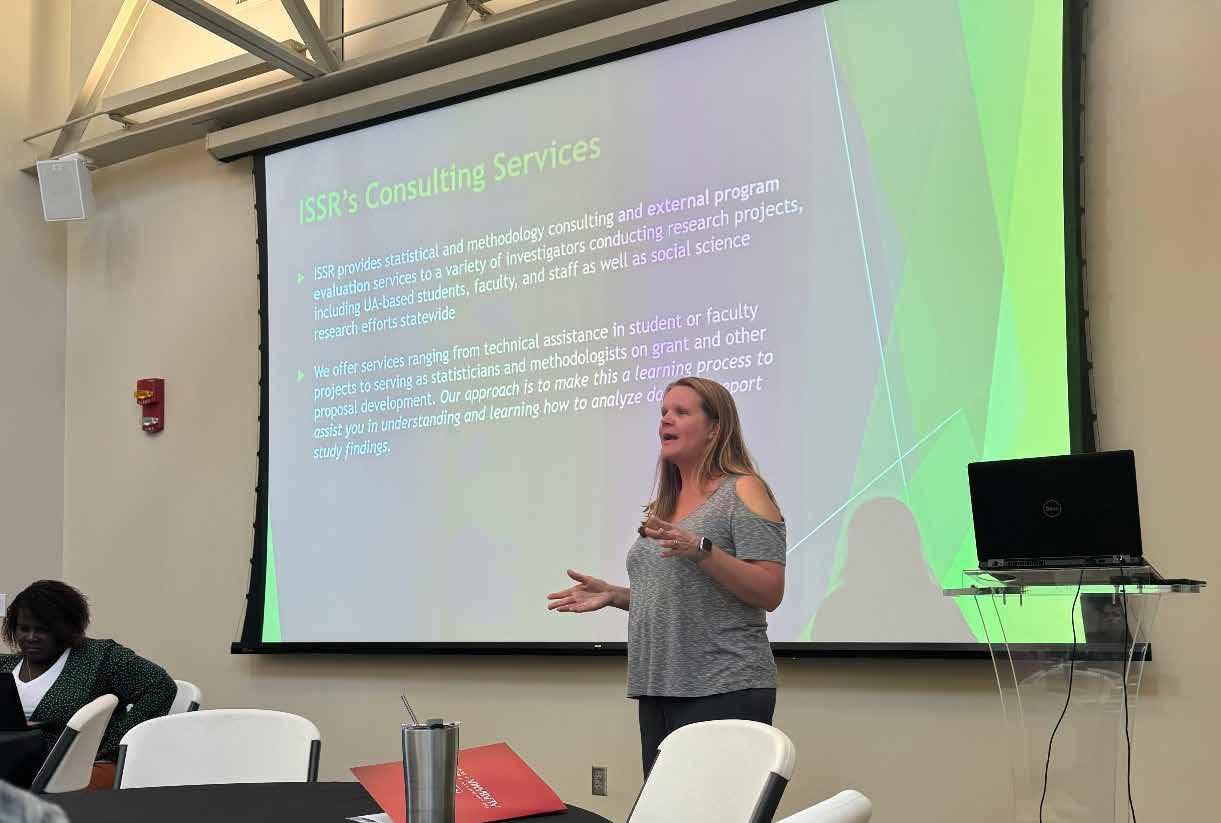
EDUCATION
T RA i N i NG THE N EXT G ENERAT i ON of s ocia L s cientists at t he u ni V ersity of aL abama

At the heart of The University of Alabama lies a vibrant community dedicated to fostering the growth and development of our students. With over 40,000 undergraduates and a growing graduate student population, we remain steadfast in our commitment to training the next generation of social scientists equipped to tackle the pressing challenges of our society. ISSR plays a pivotal role in this mission, providing a wealth of opportunities for students to engage, contribute, and thrive in the field of social science research.
Graduate Researchers Leading the Way
Graduate researchers at the ISSR drive significant advancements in the institute’s initiatives. With a commitment to addressing real-world issues, these graduate students lead critical projects, contributing fresh perspectives and specialized skills that help shape impactful solutions. Their work exemplifies ISSR’s mission to merge academic rigor with practical applications, bridging the gap between research and societal needs.

Undergraduate Researchers Making an Impact
Undergraduate students also play a vital role in our research ecosystem. At the TRIP Lab, students engage in hands-on research that informs policy decisions and community programs. Through poster presentations and collaborative projects, undergraduates gain invaluable experience in data collection, analysis, and dissemination. Their contributions help elevate research outcomes while providing them with the skills necessary for future success in the field.
Empowering Student Communication Assistants
Our Student Communication Assistants are learning the art of effectively disseminating research findings to stakeholders and audiences. This role equips them with essential communication skills and an understanding of how research can influence policy and public perception. By participating in outreach efforts and crafting materials that highlight research successes, these students are positioned to make a meaningful impact beyond the classroom.
Exposure Through ISSR Office Assistantships
Finally, our ISSR Office Assistants receive comprehensive exposure to the workings of an interdisciplinary research center. This role provides students with the opportunity to
support a variety of research projects, engage with faculty members, and collaborate with peers from different disciplines. The skills and experiences gained through this assistantship prepare them for a successful career in social science research and related fields.
Join Us at ISSR!
If you’re interested in gaining valuable experience at ISSR, we encourage you to complete an application on our website (https://issr.ua.edu). No prior experience is necessary! Many successful careers in science begin with exposure to the impactful work we do at ISSR. By joining our team, you will connect with communities, contribute to meaningful research, and develop the skills that will launch your career in social science.
As we continue to grow and expand our student population, The University of Alabama remains dedicated to nurturing the talents and aspirations of our students. By providing opportunities for engagement and research, we empower them to contribute to ISSR’s success and become the social scientists of tomorrow. Together, we are shaping a future where informed research drives positive change in our communities and beyond.
AI I NTEGRAT i ON i N S OC i AL S C i ENCES : t raining f uture Inno Vators to s o LV e s ocieta L c ha LL enges

As artificial intelligence (AI) rapidly transforms industries, its potential for interdisciplinary applications in social sciences is becoming increasingly evident. Experts advocate for training future students in AI as a technological tool and a means to address complex societal problems. By fostering an understanding of AI’s capabilities alongside social science principles, educational programs can equip the next generation of innovators to create impactful solutions.
Bridging the Gap Between AI and Social Sciences
The intersection of AI and social sciences offers exciting opportunities for addressing pressing societal issues such as public health, economic inequality, and environmental sustainability. By equipping students with AI training, programs can prepare them to analyze vast datasets, identify trends, and develop actionable insights that inform policy and practice. “AI is not just for computer scientists; it’s a tool that can be used across various fields,” said Dr. Stavrinos. “Training students to apply AI in social contexts enables them to tackle real-world challenges effectively.”
A New Horizon for Students: The HumanAI Initiative
In 2024, the HumanAI initiative celebrated its inaugural year as a Google Summer of Code (GSoC) umbrella organization, selected by Google for this prestigious program. This milestone allowed HumanAI to broaden
student participation in machine learning projects that transcended traditional boundaries, diving deep into the realms of humanities and social sciences.
HumanAI welcomed students from varied backgrounds to engage in an enriching experience that melded the rigor of machine learning with the expressive power of the humanities and social sciences. Participants had the unique opportunity to work alongside domain experts and researchers from leading institutions. This mentorship empowered students to explore innovative research projects at the cutting edge of various fields, including psychology, political science, criminology, and more.
The program featured three evaluation periods designed to foster collaboration between students and mentors. This framework encouraged the development of open-source code and facilitated continuous assessment, ensuring that participants remained on track throughout their projects.
Students eager to join the initiative explored potential projects on the HumanAI website, completing tailored evaluation tests and crafting detailed proposals for submission.
Dr. Stavrinos, ISSR Director, along with, Professors Sergei Gleyzer (UA Physics), Xabier Granja (UA Modern Languages), and Prof. Emanuele Usai (UA Physics), administered the program. Under their leadership,
HumanAI hosted three ISSR interns, each benefiting from the guidance of experienced mentors: Piyush Pawar, Erika Steele, and Sarah Dunlap. Special acknowledgment goes to Dr. Andrea Underhill, who managed the program’s day-today operations.
I ssr’s h uman a I p rojects:
Project 1: Applications of AI and Machine Learning with Eye Tracking Data in Driving Simulator Scenarios, Student Researcher: Aditya Arvind, ISSR Mentor: Piyush Pawar
This initiative utilized advanced machine learning and computer vision techniques to develop a system capable of detecting signs of fatigue and distraction in drivers through real-time video analysis. By training a machine learning model to recognize facial and behavioral indicators of fatigue, such as yawning, heavy eyelids, and head nodding, this project aimed to alert drivers to drowsiness, thereby enhancing road safety.
Project 2: Using the Baccalaureate and Beyond Data (NCES) to Test Role and Goal Congruity
Theories’ Predictions for Gender Differences in Majors and Occupations, Student Researcher: Rashi Gupta, ISSR Mentors: Erika Steele & Joan Barth
This research focused on how gender roles and perceptions influence career choices among middle school students. By analyzing data from the Longitudinal Study of American Youth, Gupta’s work revealed that by 7th grade, students exhibit gendered preferences in subject choices, impacting their future academic paths. This study highlights the necessity of integrating AI to analyze large datasets and gain deeper insights into factors influencing students’ career choices.

Project 3: Enhancing Program Evaluation Research by Leveraging AI for Integrated Analysis of Mixed-Methods Data, Student Researcher: Shao Jin, ISSR Mentor: Sarah Dunlap
This project utilized AI and machine learning to improve the analysis of mixed-methods research, which combines quantitative surveys with qualitative focus group designs. Jin analyzed data from the Alabama Youth Tobacco Survey, reverse engineering the 2016 survey to predict future data accurately. By employing various machine learning models, Jin’s work aims to provide actionable insights that enhance public health initiatives.
Project 4: Examination of the Evolution of Language among Dark Web Users, Student Researcher: Domenico Lacavalla, ISSR Mentor: Jane Daquin
This project analyzed the evolution of language used by Dark Web users through advanced Natural Language Processing (NLP) models to examine forum discussions for context, sentiment, and thematic elements. Lacavalla’s research provides a powerful tool for analyzing Dark Web data, identifying topics, language nuances, and the associations between slang terms and illicit activities, offering valuable insights for law enforcement and cybersecurity experts.

https://summerofcode.withgoogle.com
C REAT i NG O PPORTUN i T i ES FOR stem c areers through Industry e ngagement

ISSR is also actively involved in initiatives like the Alabama Louis Stokes Alliance for Minority Participation (LSAMP) and the EPSCoR DCL program, which focuses on expanding opportunities in Alabama through intensive industry experiences. Led by Drs. Joan Barth, Despina Stavrinos, Emmett J. Lodree, and UA Provost James Dalton, this initiative aims to broaden participation in STEM careers by connecting students from underrepresented backgrounds with industry partners.
“We are committed to promoting workforce development by increasing LSAMP scholars’ awareness and participation in undergraduate experiences offered by industries,” explains Dr. Barth, the lead principal investigator. This program will expose approximately 75 first-year LSAMP scholars annually to intensive industry experiences, increasing their chances of securing internships and co-ops that can lead to high-paying jobs within Alabama’s STEM fields.
The initiative includes a series of STEM Industry Days strategically located throughout the state, where students will engage in behind-the-scenes tours, panel discussions, and networking opportunities with industry experts. By limiting group sizes to around 15

Dr. Joan Barth Social Science Researcher
students, the program fosters a more personal, interactive environment that enhances connections between students and industry professionals.
“By providing students with hands-on experiences and insights into various industries, we hope to inspire them to pursue careers in STEM fields,” Dr. Barth adds. “This is not just about education; it’s about empowering the next generation of leaders and innovators.”
Through these concerted efforts, ISSR is dedicated to bridging the gap between research and community needs. By implementing impactful engagement strategies, we are committed to improving lives. Our work exemplifies how social science can be a powerful tool for positive change, ultimately leading to better outcomes for individuals and communities throughout Alabama and beyond.
CELEBRATING 40 YEARS OF EXCELLENCE AT THE INSTITUTE FOR SOCIAL SCIENCE RESEARCH

The year 2024 marks a significant milestone for ISSR as we proudly celebrate 40 years of excellence since officially joining the College of Arts and Sciences at The University of Alabama as an independent unit.
Over the past four decades, ISSR has been at the forefront of social science research, contributing to a deeper understanding of critical societal issues and providing invaluable support to faculty, students, and community partners. Our innovative research initiatives have led to meaningful impact, shaping policies and practices across various domains, from health and education to community engagement and criminal justice reform.
As we reflect on our achievements, we recognize the dedication of our faculty, staff, and collaborators who have propelled ISSR to new heights. Our commitment to evidence-based research and interdisciplinary collaboration has resulted in significant advancements and a robust portfolio of funded projects that address pressing challenges faced by our communities.
With a new era on the horizon under the leadership of Dr. Despina Stavrinos, our new Director, we are invigorated and ready to build on our legacy of success. Dr. Stavrinos’ vision for ISSR emphasizes continued innovation, increased community engagement, and a focus on addressing the social determinants that impact health and human security.
As we celebrate 40 years of impactful research, we are excited to embrace new opportunities that will further enhance our contributions to social science. Together, we will continue to advance our mission and expand our reach, ensuring that our research makes a lasting difference in the lives of individuals and communities.
We invite our partners and stakeholders to join us in celebrating the rich history of ISSR and looking forward to a future filled with promise and potential.
Here’s to 40 years of excellence and many more to come!
f uture d irections and g rowth o pportunities
At ISSR, we are excited about the new directions we are taking and the opportunities that lie ahead. Our goal is to foster collaboration, innovation, and growth within the social sciences.
Here’s how you can get involved:
Building Synergy in Social Sciences
We are dedicated to creating an ecosystem of social scientists who collaborate on large-scale, systems-level grants. In the upcoming fiscal year, we will launch new initiatives to build synergy within our new research domains.
Become an ISSR Affiliate: We invite faculty to join us as affiliates and participate in interdisciplinary projects that address complex social issues.
Benefits for Faculty Affiliates:
• Access to Resources: Utilize our infrastructure, research tools, and administrative support to focus on impactful research.
• Priority for Seed Grants: Get first access to our interdisciplinary seed grants for innovative collaborative projects.
• Networking Opportunities: Connect with a wide-ranging network of scholars and practitioners to foster new partnerships.
• Engagement in Interdisciplinary Projects: Contribute to large-scale initiatives that enhancing your research portfolio and drive societal change.
Connect with Us
Visit our Website (https://issr.ua.edu) to learn more about our initiatives and apply to become a faculty affiliate. Join us in making a meaningful impact in the social sciences.
LinkedIn: @ua-institute-for-social-science-research
Listserv: https://issr.ua.edu/about/contact-us
Support Our Mission: The Gift Fund
Charitable giving plays a vital role in expanding the scope and reach of our initiatives at ISSR.
How to donate: https://issr.ua.edu/donate
Stay connected, get involved, and help us shape the future of social sciences!
C ELE b RAT i N g R ECOR d- bREA ki N g
gRO w T h i N R E s EARC h fUN di N g AT I ss R
The University of Alabama’s College of Arts and Sciences has achieved a remarkable milestone in Fiscal Year 2024, reaching a record-breaking $41.5 million in research expenditures. This phenomenal achievement not only surpasses last year’s previous high of $34.2 million but also represents a significant 21% year-over-year increase.
As a proud department within this dynamic college, ISSR has contributed to this upward trajectory by securing $2.5 million in funding—surpassing our previous record of $1.7 million set in 2016-2017. This growth underscores our commitment to advancing social science research and highlights the vital role that ISSR plays in leading and supporting faculty and community initiatives.
This record-breaking year reflects our relentless pursuit of research excellence and dedication to addressing critical societal issues. We are excited to continue our work in fostering impactful research that benefits both the university and the broader community. ISSR’s substantial growth is a testament to the innovative projects and collaborative efforts that our team has undertaken. As we build on this momentum, we look forward to expanding our impact and further enhancing the research landscape at The University of Alabama.

Box 870216
Tuscaloosa, AL 35487
